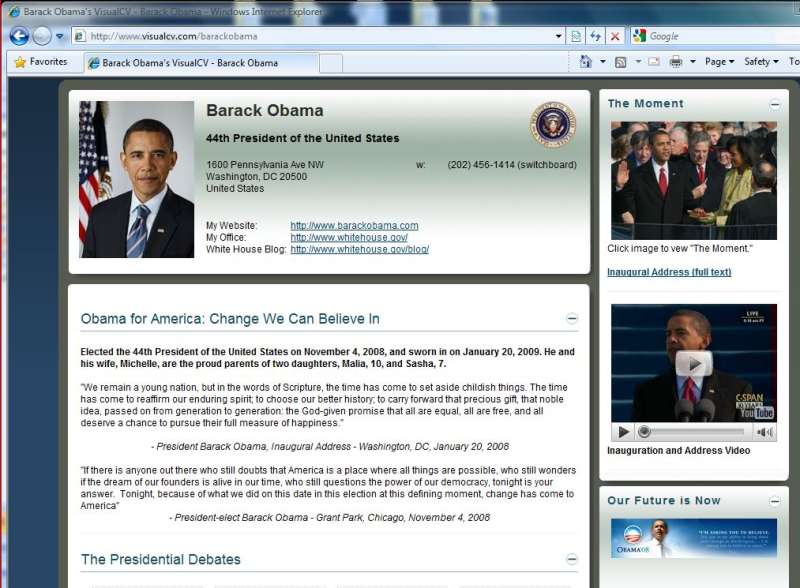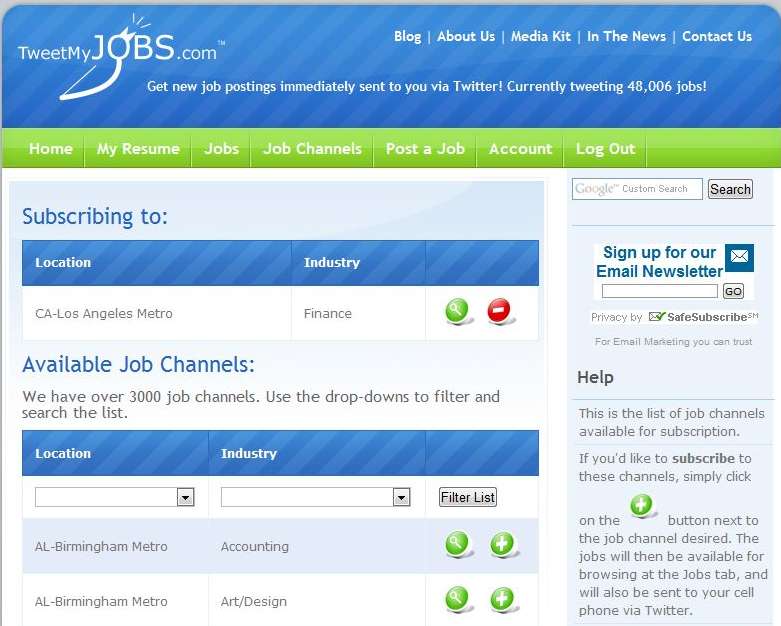When Judi Wunderlich was laid off from her managerial position at recruiting firm Aquent in early March, she spent little time looking for work on traditional job sites such as CareerBuilder, Craigslist, and Monster. Instead, she turned to social and business networking sites.
“There’s really no point in trying to apply for a job on a job board,” says Wunderlich, who lives in Chicago. “There are so many other people who are hitting the job boards and sending résumés like crazy, and I know this because I was in recruiting.”
Wunderlich used her extensive network of contacts on Facebook, LinkedIn, Meetup, and Twitter to learn of new career opportunities. “I have not applied for a job or sent a résumé out. I’ve had all this activity and meetings, and it’s all from the network,” says Wunderlich, who was still on the job hunt as of late March.

Here’s what Barack Obama’s resume looks like on VisualCV.
A new collection of Web 2.0 tools, including social networks and online résumé builders that enliven your résumé with multimedia elements, are helping job seekers market themselves in a tough economy. Internet-based services can help you stand out from the crowd, and résumé-creation sites are a good place to start.
Among them is VisualCV, a free service that lets you construct a résumé enhanced with audio and video clips, photos, slide shows, and charts. You can link your VisualCV résumé to other social media accounts, such as Facebook, LinkedIn, and Twitter. Similar, if less impressive, sites include GigTide, which charges extra for multimedia embedding, and Emurse, which offers a less-intuitive résumé builder.
Be a Schmoozer
Are social networks a better way for job seekers to find work? For laid-off professionals, particularly those active in online communities, the answer may be yes. “By the time a listing has been posted on Monster, you’re already behind,” says LinkedIn spokesperson Kay Luo. “Generally, companies already have a couple of candidates they’re interested in. And then you have to compete with the flood of résumés that comes in.”
How can job seekers use social networks effectively? The key is to be an effective networker before getting pink-slipped. “People can’t wait until they lose their jobs to start networking,” says Wunderlich. “Everybody should be doing it now.”
Be sure to connect your online profiles. Your Facebook profile, for instance, should link to your LinkedIn résumé, and vice versa. Next, notify your colleagues and friends that you’re looking for work. If you’re a Twitter user, tweet your professional (e.g., LinkedIn) profile to your followers. “That directs people back to a page where they can see everything you want them to know about you professionally,” says Luo.
If you do link your social and professional profiles, however, it’s prudent to purge photos or comments that may raise a potential employer’s eyebrow. Facebook users, for instance, may want to delete potentially offensive party pics or profanity-laced shout-outs from friends.
New Tips for Job Boards
This isn’t to say that job seekers shouldn’t post their résumés on employment sites such as CareerBuilder, Monster, and Yahoo HotJobs, or check out the listings there. But when applying for a job, don’t simply add your résumé to the applicant slush pile. Instead, try leveraging your social network to gain a competitive edge.
Say, for instance, that you’re searching Monster and you find an attractive opening at a company you’d like to work for. If your LinkedIn network includes someone who works at the company or who knows a person who does, you could ask that colleague for an inside introduction.
“When you have a referral inside a company, that’s the surest way to get your résumé in front of the right person,” says Luo. To send messages to LinkedIn users outside your network, however, you’ll have to upgrade to a premium account, which starts at $25 a month.
Many people aren’t social butterflies by nature, and cultivating contacts on multiple social networks can be tiring. If you’d rather focus on a single online community, use one that has good business tools. Facebook, despite its friends-and-family focus, offers services for job seekers, including industry-specific groups and career-oriented applications such as the Jobster Career Network. And Ryze is a business-networking site that lets users set up groups based on career and geographical region.
Try Something New
If online schmoozing doesn’t open any doors, it may be time for a new strategy. When business dried up for Patrick Downes, who sold print-media advertising for 15 years, the Hyde Park, New York, resident turned to job boards and online contacts to find full-time work.
But after six months of trying, he had limited success other than “a few little projects here and there.”

Using Twitter, Downes learned of TweetMyJobs, a free service that tweets (notifies) job seekers about new openings in their occupation and geographical region. Within days after signing up for the service, Downes received a tweet about a Subaru dealership in Albany that was seeking a salesperson.
“I love cars; I happen to have a couple of Subarus myself,” says Downes, who called the dealership and was hopeful of receiving an offer soon.
Do It Yourself
Some entrepreneurial types are using the downturn to build new online communities, which they hope will evolve into profitable businesses. When Jason Rivera lost his public-relations job in San Francisco, he sent out numerous résumés but received no response.
“While researching the latest news on the economy, I found a growing list of articles regarding pink-slip parties. I thought the idea…was genius,” wrote Rivera via e-mail. He launched Slip Squad, a site where “recovering robots,” or laid-off workers, can commiserate and share job-seeking tips.
When it comes to self-promotion, you can’t get more direct than MyHusbandNeedsaJob.com, a joint effort by Robin and Michael Stearns, a married couple in San Francisco. After Mike graduated from Georgetown last year with an MBA, the couple moved to California to be closer to his family. But with no real-world experience in the midst of a recession, he has found securing work difficult.

“There are an enormous number of people competing for every job. In that kind of situation, obviously, experience is going to trump anything,” says Mike, who credits his wife with the idea for the site. (A photo on the home page shows Robin holding a “Hire my husband” sign.)
A few days after launching the site, the Stearnses received a call from a CNN reporter, who wrote an online story about the project. Traffic skyrocketed overnight and media inquiries came flooding in, including calls from the Oprah and Dr. Phil shows. Although Mike still hasn’t found work, he thinks the site itself may have a future. “We’re going to keep it up for as long as we continue to get a lot of traffic,” he says. “It’s been so successful that we’re hopefully [going] to turn it into some sort of job-search board, or something along those lines.”
The bottom line: Market thyself. “Networking is like flossing. Many people don’t want to do it,” says LinkedIn’s Luo. But in today’s economy, a little self-promotion can go a long way.
Source: PCworld.com




